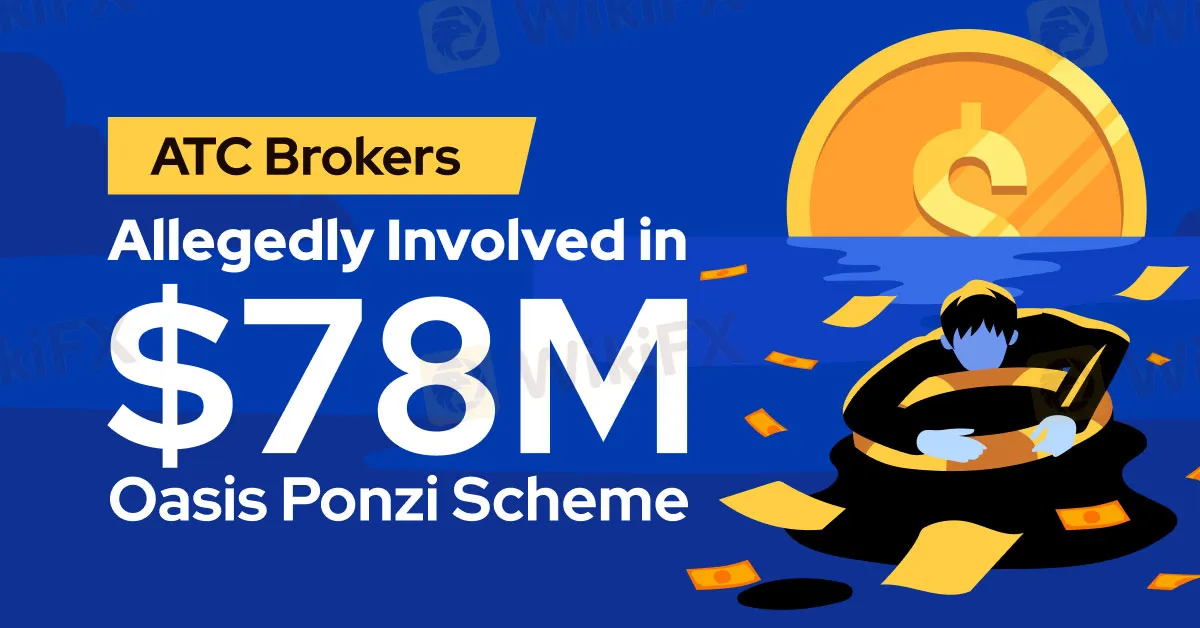简体中文
繁體中文
English
Pусский
日本語
ภาษาไทย
Tiếng Việt
Bahasa Indonesia
Español
हिन्दी
Filippiiniläinen
Français
Deutsch
Português
Türkçe
한국어
العربية
ATC Brokers Allegedly Involved in $78M Oasis Ponzi Scheme
Abstract:The legal battle surrounding Oasis, a fraudulent $78 million forex investment scheme, has shifted course as the court reconsiders a complaint against alleged accomplices, including ATC Brokers, amidst accusations of involvement in fraudulent transfers, shedding light on a complex Ponzi scheme that deceived investors with promises of high returns.

The legal proceedings concerning Oasis, a fraudulent scheme worth $78 million posing as a forex exchange investment fund, have taken a new direction as the court reversed its decision to dismiss a complaint against alleged accomplices, including ATC Brokers.
Burton Wiand, representing Oasis International Group as the receiver, filed a lawsuit against ATC Brokers Ltd., co-founder David Manoukian, and Spotex LLC, accusing them of involvement in fraudulent transfers. Initially, the district court dismissed Wiand's claims, citing lack of standing and statutory immunity under the Communications Decency Act. Wiand's objective was to recover assets for the investors who suffered losses due to the purported forex trading venture promising high returns.
Oasis International Group portrayed itself as an attractive investment opportunity, pledging substantial profits through currency futures trading. However, it was later revealed to be an elaborate Ponzi scheme, deceiving investors and causing financial harm. Despite promising high returns, Oasis operators concealed losses, misused funds, and distributed fictitious profits, as indicated in court documents.

The appeal filed before the US District Court for the Middle District of Florida challenged the previous dismissal, asserting that Wiand indeed had standing to pursue fraudulent-transfer claims. Although the court acknowledged Wiand's lack of standing for tort claims, it erred in dismissing those claims with prejudice and in addressing the issue of statutory immunity prematurely.
ATC Brokers, headquartered in England and Wales, facilitated trading activities for Oasis, while Spotex provided software to present false returns to investors. Wiand's legal pursuit targeted these entities, alleging their involvement in facilitating the fraudulent scheme's operations.
The court emphasized that as a registered forex broker, ATC Brokers was obligated to conduct due diligence before accepting potential traders. ATC Brokers' services allowed licensed foreign investment entities to trade on London markets on behalf of their underlying investor clients.
ATC Brokers' approval of Oasis' forex trading accounts and provision of liquidity reportedly enabled Oasis to engage in high-risk trading activities. Leveraging at 100:1, Oasis made substantial bets, ultimately resulting in significant losses, according to the court's findings.

Disclaimer:
The views in this article only represent the author's personal views, and do not constitute investment advice on this platform. This platform does not guarantee the accuracy, completeness and timeliness of the information in the article, and will not be liable for any loss caused by the use of or reliance on the information in the article.
Read more

WikiFX Announcement: Suspension of Weekly Simulated Trading Competition
Since its launch in early 2023, the WikiFX Weekly Simulated Trading Competition has successfully hosted 99 consecutive rounds, attracting enthusiastic participation from traders worldwide and creating countless thrilling trading moments.

What Can Forex Traders Learn from Ne Zha?
The animated blockbuster Ne Zha: Birth of the Demon Child tells the story of Ne Zha’s journey to defy fate and take control of his own destiny. Beyond being an inspiring tale filled with action and character growth, the film conveys profound life lessons - many of which resonate deeply with the world of forex trading.

Retirement Savings Wiped Out: RM500,000 Lost to a Scammer named Richard Ong
A retiree was deceived into parting with more than RM500,000 after falling victim to an elaborate investment scam that promised substantial returns.

The Dark Side of Social Media Investments: How a Manager Lost RM2.08 Million
A Malaysian company manager suffered financial losses amounting to RM2.08 million after becoming the victim of an investment scam promoted through Facebook.
WikiFX Broker
Latest News
The Growing Threat of Fake Emails and Phishing Scams
Africa Cybercrime Bust: Over 300 Arrested in Fraud Crackdown
Hong Kong Banks and Authorities Collaborate to Freeze Fraudulent Accounts Faster
SocialFi and the Forex Market: A New Era for Decentralized Social Trading?
Is Billion Bucks Fx Scam?
BaFin Halts USDe Token Issuance, Citing Serious Compliance Failures
The Rise and Risks of Forex Signal Apps: An In-Depth Analysis
Enlighten Securities Penalized $5 Million as SFC Uncovers Risk Control Failures
PH Telecom Offers Free App to Protect Users from Scams
Fed Rate Cut Expectations Lowered
Currency Calculator









